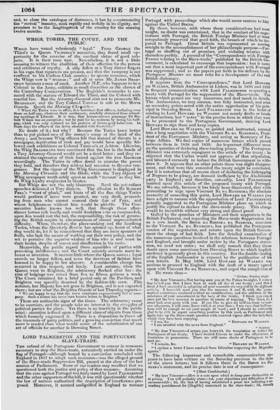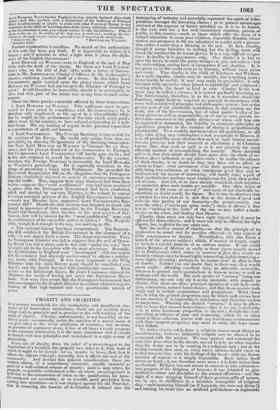LORD PALMERSTON AND THE PORTUGUESE SLAVE-TRADE.
THE refusal of the Portuguese Government to concur in measures necessary to stop the Slave-trade, extensively carried on under the flag of Portugal—although bound by a convention concluded with England in 1817 to adopt such measures—was the alleged ground of the Slave-trade Suppression Bill, passed at the close of the last session of Parliament. Some of our readers may recollect that we questioned both the justice and policy of that measure. Assuming that the case against Portugal was thirly stated by Lord PALMERSTON and the other supporters of the bill, it was still questionable whether the law of nations authorized the description of interference pro. posed. Moreover, it seemed undignified in England to menace
Portugal with proceedings which she would never veuture to hint. against the United States.
By those, however, with whom these considerations had most weight, no doubt was entertained, that in the conduct ofhis nege. tiations with Portugal, the British Foreign Minister had at least scrupulously preserved that good faith, the breach of which he has puted to Portugal. Great Britain was represented as moving straight to the accomplishment of her philanthropic purpose—Por
tugal as shuffling out of promises, and violating treaties with shameless perfidy. A perusal of the "Correspondence with Foreign Powers relating' to the Slave-trade," published by the British Go. vernment, is calculated to encourage that impression : but it turns out that a most important part of the correspondence \Vial Portugal was suppressed ; and to the papers put forth in his defence by the Portuguese Mhtister we must refer for a development of the real British diplomacy.
It appears from the " Correspondence," that Lord Howson DE Waimea, British Ambassador at Lisbon, was in 1838 and 1839 in frequent communication with Lord PALMERSTON respecting a treaty with Portugal for the suppression of the Slave-trade. The letters which passed are very numerous, and deal much in details. The Ambassador, we may assume, was fully instructed, and even on secondary points acted with the entire approbation of his prin. cipal in Downing Street. Lord PALMERSTON was in the habit of sending to Lord I-TOWARD DE WALDEN not merely drafts or heads of instructions, but " notes" in the precise form in which they were to be presented to the Portuguese Government, desiring Lord Howaan to sign them and keep copies. Lord HOWARD DE WALDEN, so guided and instructed, entered into a lone negotiation with the Viscount SA DA BANDEIRA, President of the Portuguese Ministry, and acting as Secretary of Foreign Affairs. We find copies of numerous letters which passed between them in 1838 and 1839. An important difference arose on the question of declaring slave-trading piracy. The Portuguese Minister was extremely repugnant to this article of the treaty : he objected that the Cortes would not approve of that stipulation, and laboured earnestly to induce the British Government to with. draw it. It appears that on other points there was slight disagreement, and that were this conceded the treaty might be concluded. But it is notorious that all means short of declaring the kidnapping of Negroes to be piracy, are deemed inefficient by the Abolitionist party in England ; and therefore, ostensibly, Lord PALMERSTON insisted upon this article of the proposed treaty with Portugal. We say ostensibly, because it has lately been discovered, that while pretending to urge upon Viscount SA DA BANDEIRA the absolute necessity of conceding this point, Lord HOWARD DE WALDEN (we have aright to assume with the approbation of Lord PALMERSTON) actually suggested to the Portuguese Minister pleas on which to justify the refusal to declare the slave-trade piracy. This charge would be incredible without very strong and direct proof. Galled by the speeches of Ministers and their supporters in the British Parliament, and regarding the Slave-trade Suppression Act as a sore insult, the Baron DA BIREIRA DA SADROSA, successor to the Viscount SA i BANDEIRA, has published the Portuguese version of the negotiation, and retorts upon the British Government the charge a bad faith. Into the detailed examination of the numerous questions involved in the relations between Portugal and Eugland, and brought under review by the Portuguese statesman, we need not enter ; we shall only remark that they throw doubt upon some assertions from Downing Street to which implicit credence is generally given in this country. But the double-dealing of the English Ambassador is exposed by the publication of his own letters. In May 1838, Lord HOWARD DE WALDEN was anxious to proceed to England with the draft of a treaty agreed upon with Viscount SA DA Bassuinea, and urged the completion of
it. He wrote thus
" Lisbon, Sunday night.
"My dear Viscount—Not having seen you at the Palace to-night, I write a line to tell you that I have been at work all day at our treaty ; and that I think I have succeeded in adapting all your amendments very well to the different articles. I herewith send you also the annexes A and B, with the grammatical corrections rendered evident on consideration, and the addition Of the substance of your amendment in the body of the treaty. I think you can at once put the two annexes in question in course of copying. The third, C, must look over again with you. If you like to give me half-an-hour to-morrow afternoon, I will come down with it at your time ; I am sure that half-anhour will be enough to set your people at work ; and I should be extremely glad to he able to report something positive by this mail, as Parliament may again take up the Slave-trade question with renewed vigour after the holydays, which they have been enjoying.
Sunday. " My dear Viscount—I return you herewith the translation or"ratlieite Portuguese of our treaty. I have desired Craven to make the alterations of dominions in possessions. There are still some sheets of Portuguese to be sent me.
"I remain, &c. " HOWARD DE WALDEN.
"I enclose a letter I have received from Gibraltar respecting the Miguelite agents."
The following important and remarkable communication appears to have been written on the Saturday previous to the date of the above letters ; but it follows them in the Baron DA Mut:ma's statement, and its precise date is not of consequence.
" (Most Confidential.) " My dear Viscount—Here is a note upon which to hang your declaration .as to piracy. You will probably state—let, your objections and difficulties if insurmountable ; 2d, the fact of having established a penal law inflicting a secondary punishment for (illegible) concerned in the slave-trade; 3d, remark ou no European Power besides England having actually declared slave•trade piracy ; and, 4th, conclude with a declaration of the readiness of Portnaal Wier simultaneously or jointly to unite with other Powers of Europe in any reesolution to the effect of declaring slave-trade piracy, although, circumstanced tu the Government is now, you cannot venture to take the initiative. This, in short, strikes me as the outline of the best case to make out ; :cording the conchtsion as strongly as you can in a yeneral vim denouncing the slate-trade. "HOWARD DE WALDEN. Believe me, &C.
"Saturday night."
Further explanation is needless. No denial of the authenticity of this note has been put forth. It is impossible to believe it a forgery ; and if genuine, in what a light does it place the diplomacy of the English Government !
Lord Howann DE Wasnsis went to England at the end of May 1838, with the draft of the treaty. He there saw Lord PALMERSTON ; who, on the 23d of' July 1838, wrote a letter of instructions to Mr. JERNINGHAM, ChargS; d'Affaires in the Ambassador's absence, enclosing another draft of a treaty. In this letter Lord PALMERSTON again insisted upon the piracy clause, which Lord 110WARD DE WALDEN had encouraged the Minister of Portugal to reject ! It will therefore be impossible, should it be attempted, to show that this part of the treaty was at any time deemed unimportant.
There are three parties especially affected by these transactions.
I. Lord Howano DE WALDEN. This nobleman must be presumed to have acted in compliance with his instructions ; he is therefore only implicated as the agent in a discreditable afihir. But he ought, in the performance of the duty which every public officer owes to his country, to have refused conperation in a political fraud. We say nothing of regard to his personal reputation as a gentleman of' spirit and honour.
2. Lord PALMERSTON. The Foreign Secretary is responsible for the conduct of his Envoy. He could only escape from that responsibility by showing his ignorance of the damnin,b communication from Lord Howasn DE WALDEN to Viscount SA DA BANDEIRA, and the prompt dismissal of the Ambassador to Portugal. But for ignorance Lord PALMERSTON will hardly gain credit ; and he has not ventured to recall his Ambassador. To the country, therefore, the Foreign Secretary is answerable for Lord HOWARD DE WALDEN'S proceedings. lie is especially obnoxious to the charge of practising a fraud upon Parliament. lie grounded his Slave-trade Suppression Bill on the allegation that she Portuguese Ministry obstinately objected to accede to measures necessary to stop the traffic. Now, suppose facts since disclosed had then been known—suppose the " most confidential" note had been produced to prove that the Portuguese Government had been comforted, aided, and abetted by our own Minister, in the refusal to concur in a most essential portion of the English Government's demands —would any Member have supported Lord PALMERSTON'S Suppression Bill ? Manifestly that measure was founded on fraud, and passed in ignorance of facts concealed by the Foreign Secretary. Should this functionary show his face in the next session of Parliament, how will he answer for the "most confidential" note, and the continuance of its ostensible author at Lisbon ? The Portfolio affhir, though bad enough in its way, was nothing to this.
3. The national honour has been compromised. The Suppres sion Bill exhibited the British Government in the character of a bully-sit now stands forth a cheat. The fraud was twofold. First, the Portuguese Minister was led to suppose that the zeal of Downing Street was but a sham, and he was told " under the rose," how he might aid in the deception with the most advantage. Secondly, the Abolitionists in England were "humbugged" with the notion that Government had sincerely endeavoured to obtain a satisfactory treaty with Portugal. It was most important to the Whig Ministers that the Anti-Slavery party should be conciliated and duped ; and the deceit has met with considerable success. Even so late as the Edinburgh dinner, Sir JOHN CAMPBELL claimed for Ministers the credit of having put down the Portuguese Slavetrade. Few were then aware that the Portuguese Government had been encouraged by the English Minister in conduct adduced as justification of that high-handed and very questionable stretch of power.



























 Previous page
Previous page